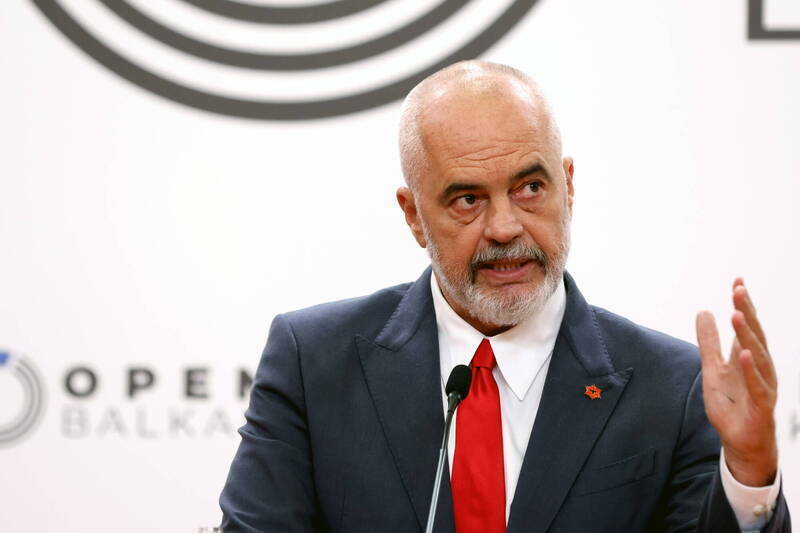Prime Minister Rama of Albania.
(European News Agency file photo)
[Reporter Yang Chengyu/Taipei Report] President Xiomara Castro of Honduras, my country's Central American ally, said on the 15th of this month that she has assigned Foreign Minister Eduardo Enrique Reina to handle the establishment of diplomatic relations with China.
Reina admitted on the 15th that this decision was due to Hongguo's rising debt and investment needs.
Our Ministry of Foreign Affairs emphasized that we will never compete with China for money, and reminded Hongguo not to "drink poison to quench thirst" and instead fall into China's debt trap.
As for whether joining China's "Belt and Road" is an economic panacea, Albania, as the first wave to establish diplomatic relations with China in 1949, has a very clear answer.
Albania established diplomatic relations with the People's Republic of China in November 1949, becoming its tenth diplomatic relationship with the People's Republic of China.
Albania signed a cooperation agreement under the framework of China's "Belt and Road Initiative" in 2017, and is also a member of the "China-Central and Eastern European Countries Cooperation" mechanism (CCEC, formerly known as 17+1).
After "17+1" was the first to withdraw from Lithuania in May 2021, and Latvia and Estonia in August 2022, only "14+1" remains.
Please read on...
Albanian Prime Minister Edi Rama accepted an exclusive interview with Nikkei Asia when he visited Japan in late February.
In an exclusive interview, Rama bluntly stated that the "14+1" framework, which China regards as the cornerstone of the "Belt and Road" Initiative's influence, "has not brought any benefits to Albania", and pointed out that in terms of economic results, he personally "would say yes zero".
However, he will still let Albania stay in this mechanism as a channel to maintain communication with China. "It is very important to have more dialogues with countries at this time."
According to the "Foreign Policy" article "Albania will become a new battlefield for the Belt and Road Initiative", although most countries in the Balkans are eager for the RMB from China, Albania is an outlier and selectively deals with China.
Among the 120 energy and infrastructure cooperation projects related to China in the Balkans with a total value of more than 32 billion U.S. dollars, Albania has not exchanged huge loans from China for development opportunities in principle.
China's "Belt and Road" initiative is often regarded as a "debt trap", and the representative work in the Balkans is in Montenegro, Albania's northern neighbor.
According to foreign media reports, Montenegro signed a contract with China in 2014 to build a 163-kilometer expressway with a loan of about US$1 billion. China even regards it as a "Masterpiece of the Belt and Road Initiative."
However, when Mongolia just started to repay the loan in 2021, its finances were immediately dragged down, and it was finally rescued by the European Union.
After experiencing disputes such as poor engineering quality, schedule delays, and contract black boxes, the expressway was finally opened to traffic for 41 kilometers in July last year.
The remaining 122 kilometers section is still undecided.
In addition, according to a report by META, an independent news media in North Macedonia, the country built a 57-kilometer expressway with a loan from China through the "Belt and Road Initiative". After nine years and two major delays, the construction has not yet been completed.
The National Auditor of Northern Malaysia also questioned the effectiveness of the project.
After entering the North Macedonian market through the "Belt and Road" project, "Sinohydro" took root locally and competed for bids for projects at low prices, including investment projects supported by the European Bank for Reconstruction and Development (EBRD). This move is also considered to have affected local enterprises.
